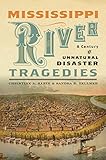Mississippi River Tragedies : A Century of Unnatural Disaster / Sandra B. Zellmer, Christine A. Klein.
Material type: TextPublisher: New York, NY : New York University Press, [2014]Copyright date: ©2014Description: 1 online resourceContent type:
TextPublisher: New York, NY : New York University Press, [2014]Copyright date: ©2014Description: 1 online resourceContent type: - 9781479825387
- 9781479807475
- 363.3493560977 23
- TC423.4 .K54 2016
- online - DeGruyter
| Item type | Current library | Call number | URL | Status | Notes | Barcode | |
|---|---|---|---|---|---|---|---|
 eBook
eBook
|
Biblioteca "Angelicum" Pont. Univ. S.Tommaso d'Aquino Nuvola online | online - DeGruyter (Browse shelf(Opens below)) | Online access | Not for loan (Accesso limitato) | Accesso per gli utenti autorizzati / Access for authorized users | (dgr)9781479807475 |
restricted access online access with authorization star
http://purl.org/coar/access_right/c_16ec
Read a free excerpt here!American engineers have done astounding things to bend the Mississippi River to their will: forcing one of its tributaries to flow uphill, transforming over a thousand miles of roiling currents into a placid staircase of water, and wresting the lower half of the river apart from its floodplain. American law has aided and abetted these feats. But despite our best efforts, so-called "natural disasters" continue to strike the Mississippi basin, as raging floodwaters decimate waterfront communities and abandoned towns literally crumble into the Gulf of Mexico. In some places, only the tombstones remain, leaning at odd angles as the underlying soil erodes away. Mississippi River Tragedies reveals that it is seductively deceptive-but horribly misleading-to call such catastrophes "natural." Authors Christine A. Klein and Sandra B. Zellmer present a sympathetic account of the human dreams, pride, and foibles that got us to this point, weaving together engaging historical narratives and accessible law stories drawn from actual courtroom dramas. The authors deftly uncover the larger story of how the law reflects and even amplifies our ambivalent attitude toward nature-simultaneously revering wild rivers and places for what they are, while working feverishly to change them into something else. Despite their sobering revelations, the authors' final message is one of hope. Although the acknowledgement of human responsibility for unnatural disasters can lead to blame, guilt, and liability, it can also prod us to confront the consequences of our actions, leading to a liberating sense of possibility and to the knowledge necessary to avoid future disasters.
Mode of access: Internet via World Wide Web.
In English.
Description based on online resource; title from PDF title page (publisher's Web site, viewed 01. Nov 2023)


